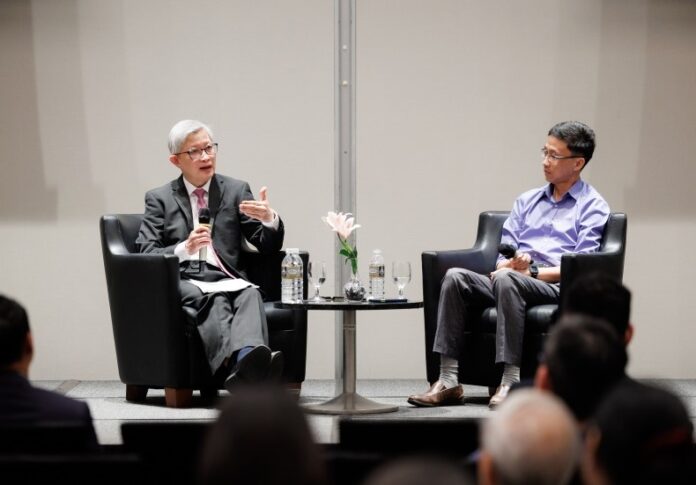While globalisation is often perceived as a modern phenomenon, reading across cultures has been practised for centuries, said Professor Tan Tian Yuan at the start of this year’s NUSS Professorship Lecture on 18 April 2023. He then observed, “And for readers, before the age of global travels, such literary encounters might have been their only encounters with a foreign country and culture.”
Prof Tan cited a French literary salon gathering in mid-18th century where the main attraction was French writer Voltaire’s reading of a work, titled ‘Tragedy of the Orphan of China’, which was based on the 13th century Chinese drama known as ‘The Orphan of Zhao’. Voltaire, who could not read Chinese, based his play on a French translation by a Jesuit missionary.

Listening intently was an audience consisting of NUSS members, guests and NUS students who had gathered at the Della & Seng Gee Guild Hall at NUSS Kent Ridge Guild House to hear Prof Tan expound on ‘Literary Encounters: Reading Across Cultures’. They also learned that ‘The Orphan of Zhao’ is the first Chinese play to be translated into a European language. The French translation then sparked off more adaptations in English and other European languages.
Attraction of universal themes
Addressing the reasons why ‘The Orphan of Zhao’ became popular in Europe, Prof Tan said, “We can look at some universal themes that work across cultures: revenge, loyalty, and self-sacrifice. It is also about choices one makes. In this case, the choices of people sacrificing their own lives or offspring, e.g. a baby-swap was done in order to help protect the only heir of the Zhao clan.”
Secondly, he referred to the European fascination in the 18th century for all things Chinese. Since then, Western audiences are more likely to encounter the same story via new film adaptations such as the ‘Zhaoshi gu’er’ (English title, ‘Sacrifice’), or the stage production by the Royal Shakespeare Company in 2012.
There is now a new translation based on the 14th century version of the play, rather than on the revised Ming dynasty version in the 17th century. Prof Tan pointed out, “After about 300 years since the play was introduced to Europe, Western readers finally get to read a version that was probably closest to the original 13th century Chinese drama.”
Chinese literature even featured on Western media
On 12 May 2022, BBC Radio 4 programme ‘In Our Time’, highlighted the poetry of two of China’s greatest poets, Li Bai and Du Fu, who wrote in the 8th century. In this weekly BBC programme, host Mr Melvyn Bragg and three specialists on the subject discuss the ideas, people and events that have shaped our world. The programme began in 1998 and has now aired close to 1,000 episodes.
Prof Tan highlighted that the episode on Tang-era poetry was not a one-off as there had been earlier discussions on Chinese history and Chinese literary masterpieces. Reinforcing his point of ‘Reading Across Cultures’, he said that the programme recently focused on the ancient Sanskrit epic ‘Ramayana’.
Chinese poems during the Christmas season?
The Economist magazine mainly features articles on international politics, economics and the environment but in 2022, the publication ran a feature on ancient Chinese poems in its Christmas edition. Prof Tan quoted this extract from the article, “In the West, poetry is a minority pursuit; in China it is woven into people’s lives.”
He added, “Much like the way nowadays we are so used to texting a message to a friend, a Tang writer would write a poem to send off a friend and wish him well. It is in such everyday occasions that we sometimes find the true brilliance of a poet like Li Bai.”
For instance, while drinking with a friend, he produced a famous couplet. The literal translation is:
‘Drawing sword, cut into water, water again flow:
Raise cup, quench sorrow, sorrow again sorry.’
Prof Tan highlighted that there is something very direct in these lines about life’s inescapable sorrows, that one might even call universal sentiments. The article in the Economist also sends out a subtle but critical message to its readers: That reading Chinese poetry reminds one that “China is much more than the 21st-century state depicted in the media”.
Prof Tan observed, “When we read the literature of a certain country, it allows us to see a different side of their culture and traditions and importantly, to gain a different way of understanding the nation.”
He then highlighted Tang Xianzu (1550-1616), a major playwright and a contemporary of Shakespeare and therefore sometimes referred to as the “Chinese Shakespeare”. Much has been said about how their works share common themes such as love, humanity, and selfhood. He hoped this process which he called Reciprocal Gaze will encourage more such explorations.

When asked by NUSS member Dr Francis Pavri about the extent of the reading of Western literature in China, Prof Tan said that the translation scene there is very active and there is no doubt that there are more Chinese scholars studying the works of Shakespeare for example than Western scholars focusing on Chinese literature.
Prof Tan Tian Yuan is Shaw Professor of Chinese in the Faculty of Asian and Middle Eastern Studies and a Professorial Fellow of University College at the University of Oxford. He obtained his BA and MA at NUS before completing his PhD at Harvard University.
Moderating the event was Prof Ong Chang Woei, Head of the Department of Chinese Studies at NUS. He too received his BA and MA from NUS and PhD from Harvard.
NUSS established the NUSS Professorship with an endowment of $1.5 million to fund eminent professors from different disciplines to share their knowledge with the NUS community and general public. This Professorship is part of NUSS’ efforts to contribute to the development of meaningful interaction with its alma mater through academic pursuits.








